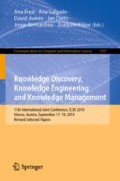Abstract
Living in a knowledge-based society, one of the most important tasks of decision makers is to know how to deal with information and knowledge that add value to their activities. Decision makers need to retrieve high-quality sets of information in order to gain competitive advantages in their business world. Otherwise, companies may struggle with several difficulties when it comes to market competition and business reputation. What-If analysis tools can help decision-makers in this matter. This technique allows for simulating hypothetical scenarios without harming the business and helping anticipate future events, by testing hypothesis. Therefore, in this paper, we propose a hybridization approach and develop a hybrid methodology, which aims at discovering the best recommendations for What-If analysis scenarios’ parameters using OLAP usage preferences. We also develop a software platform to illustrate the hybrid methodology with a specific case study. This hybridization process will help the user during the design and implementation of a What-If analysis process, overcoming the pitfalls of the conventional What-If analysis process.
Access this chapter
Tax calculation will be finalised at checkout
Purchases are for personal use only
References
Golfarelli, M., Rizzi, S. Proli, A.: Designing what-if analysis: towards a methodology. In: DOLAP 2006, Arlington, Virginia, USA, pp. 51–58 (2006)
Harinarayan, V., Rajaraman, A., Ullman, J.: Implementing data cubes efficiently. ACM SIGMOD Rec. 25(2), 205–216 (1996)
Golfarelli, M., Rizzi, S.: Expressing OLAP preferences. In: Winslett, Marianne (ed.) SSDBM 2009. LNCS, vol. 5566, pp. 83–91. Springer, Heidelberg (2009). https://doi.org/10.1007/978-3-642-02279-1_7
Jerbi, H., Ravat, F., Teste, O., Zurfluh, G.: Preference-based recommendations for OLAP analysis. In: Pedersen, T.B., Mohania, M.K., Tjoa, A.M. (eds.) DaWaK 2009. LNCS, vol. 5691, pp. 467–478. Springer, Heidelberg (2009). https://doi.org/10.1007/978-3-642-03730-6_37
Carvalho, M., Belo, O.: Enriching what-if scenarios with OLAP usage preferences. In: Proceedings of The 8th International Conference on Knowledge Discovery and Information Retrieval (KDIR 2016), Porto, Portugal, 9–11 November (2016)
Carvalho, M., Belo, O.: The added value of OLAP preferences in what-if applications. In: Proceedings of The 11th International Conference on Knowledge Discovery and Information Retrieval (KDIR 2019), Vienna, Austria, 17–19 September (2019)
Kottemann, J.E., Boyer-Wright, K.M., Kincaid, J.F., Davis, F.D.: Understanding decision-support effectiveness: a computer simulation approach. IEEE Trans. Syst. Man Cybern.-Part: Syst. Hum. 39(1), 57–65 (2009)
Zhou, G., Chen, H.: What-if analysis in MOLAP environments. In: Sixth International Conference on Fuzzy Systems and Knowledge Discovery, 2009. FSKD 2009, vol. 2, pp. 405–409. IEEE (2009)
Golfarelli, M., Rizzi, S.: What-if simulation modeling in business intelligence. In: Business Information Systems: Concepts, Methodologies, Tools and Applications, pp. 2229–2247. IGI Global (2010)
Gavanelli, M., Milano, M., Holland, A., O’Sullivan, B.: What-if analysis through simulation-optimization hybrids. In: ECMS, pp. 624–630 (2012)
Xu, H., Luo, H., He, J.: What-if query processing policy for big data in OLAP system. In: Advanced Cloud and Big Data (CBD), 2013 International Conference, pp. 110–116. IEEE (2013)
Hung, N.Q.V., Tam, N.T., Weidlich, M., Thang, D.C., Zhou, X.: What-if analysis with conflicting goals: recommending data ranges for exploration. In: Proceedings of the VLDB Endowment, vol. 10, no. 5 (2017)
Deutch, D., Ives, Z.G., Milo, T., Tannen, V.: Caravan: provisioning for what-if analysis. In: CIDR. ISO 690 (2013)
Saxena, G., Narula, R., Mishra, M.: New Dimension Value Introduction for In-Memory What-If Analysis. arXiv preprint arXiv:1302.0351 (2013)
Hartmann, T., Fouquet, F., Moawad, A., Rouvoy, R., Traon, Y.L. GreyCat: Efficient What-If Analytics for Data in Motion at Scale. arXiv preprint arXiv:1803.09627 (2018)
Herodotou, H., Babu, S.: A what-if engine for cost-based mapreduce optimization. IEEE Data Eng. Bull. 36(1), 5–14 (2013)
Shao, G., Brodsky, A., Shin, S.J., Kim, D.B.: Decision guidance methodology for sustainable manufacturing using process analytics formalism. J. Intell. Manufact. 28(2), 455–472 (2014). https://doi.org/10.1007/s10845-014-0995-3
Han, J.: OLAP mining: An integration of OLAP with data mining. In: Proceedings of the 7th IFIP, pp. 1–9 (1997)
Microsoft Visual Studio, Visual Studio - Best-in-class tools for any developer. https://visualstudio.microsoft.com/. Accessed 28 Jan 2020
Agrawal, R., Srikant, R. Fast algorithms for mining association rules. In: Proceedings of 20th International Conference Very Large Data Bases, VLDB, vol. 1215, pp. 487–499 (1994)
SQL Server Blog. https://cloudblogs.microsoft.com/sqlserver/2016/06/09/wideworldimporters-the-new-sql-server-sample-database/. Accessed 5 Mar 2017
Kimball, R.: The Data Warehouse Toolkit: The Definitive Guide to Dimensional Modeling. John Wiley & Sons, Hoboken (2013)
Microsoft Office Excel. https://products.office.com/en/excel. Accessed 28 Jan 2020
Acknowledgments
This work has been supported by FCT–Fundação para a Ciência e Tecnologia within the R&D Units Project Scope: UIDB/00319/2020.
Author information
Authors and Affiliations
Corresponding author
Editor information
Editors and Affiliations
Rights and permissions
Copyright information
© 2020 Springer Nature Switzerland AG
About this paper
Cite this paper
Carvalho, M., Belo, O. (2020). An Upper Level for What-If Analysis. In: Fred, A., Salgado, A., Aveiro, D., Dietz, J., Bernardino, J., Filipe, J. (eds) Knowledge Discovery, Knowledge Engineering and Knowledge Management. IC3K 2019. Communications in Computer and Information Science, vol 1297. Springer, Cham. https://doi.org/10.1007/978-3-030-66196-0_4
Download citation
DOI: https://doi.org/10.1007/978-3-030-66196-0_4
Published:
Publisher Name: Springer, Cham
Print ISBN: 978-3-030-66195-3
Online ISBN: 978-3-030-66196-0
eBook Packages: Computer ScienceComputer Science (R0)

